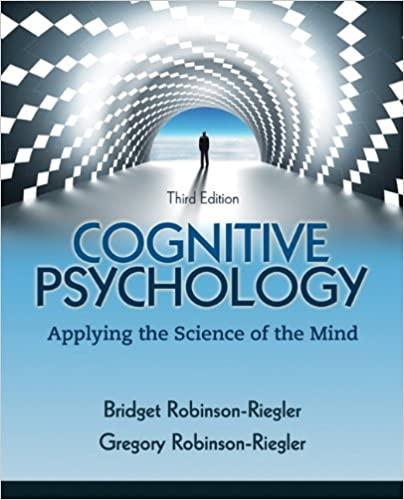Question
Case Study 3 - Living Environments and Rights Part 1: You may need to recall some of the materials or additional research regarding Older Adults
Case Study 3 - Living Environments and Rights
Part 1:
You may need to recall some of the materials or additional research regarding Older Adults and Resident Rights (of nursing homes and assisted living facilities). Prepare written answers to the following questions (at least a sentence each!). BE SURE TO FULLY ANSWER TO QUESTION USING DETAILS AND EXAMPLES IF NEEDED:
1. Why do we attach so much importance to the notion that adults should be independent?
2. What terms are commonly used to describe adults who are viewed as a dependent? Why do you think these are terms that people use? Are these terms helpful or hurtful? Explain your answers.
3. What does it mean for an older adult to be independent? Be specific.
4. When is an older person no longer physically independent?
5. Given two examples of mental self-reliance (not having to rely on others for mental tasks).
6. How does access to transportation affect the level of independence of older people?
7. Describe the resources of an older adult whom you consider to be financially independent.
8. Many Americans believe that residing in one's own home is an important part of independence. Give two reasons why many older people view the prospect of moving from their homes as a loss of independence.
9. Older people may view a move to a nursing home as the final blow to their independence. How can nursing home staff assist residents in their efforts to maintain independence?
10. In what situation would a nursing home be a better decision than an older adult living on their own? How would you explain that to the older adult?
Part 2:
Read the following scenario and then answer the questions below the scenario.
Edna, an 83-year-old with mild dementia, has lived in a nursing home for the past three years. Her only remaining family is an estranged daughter. Although she can walk with assistance, she prefers to use a wheelchair. Edna has formed a strong attachment to George, a 90-year-old with moderate to severe dementia symptoms, depending on the day and his stress level. George's chart also documents a diagnosis of transient ischemic attacks. George is quite handsome and is "the catch of the nursing home". Edna feels important when George is pushing her around in her wheelchair. Being with George has become a status symbol for Edna. George's roommate, Bud, has complained that he does not have any privacy. Edna and George neglect to pull the privacy curtain when they are lying in George's bed. Bud's family also has complained about how embarrassing it is, especially for younger family members, to find Edna and George in bed together when they visit. Edna's daughter called the nursing home and told the head nurse that the facility should stop this relationship because Edna and George were too old to have sex. She demanded that something be done immediately and indicated that if some measures were not taken, she would move her mother to another facility.
The staff of the facility have offered Edna and George the opportunity to room together. Some staff members are uncomfortable with this relationship because George is more confused than Edna, and they feel that she dominates the relationship. They suspect that she can be physically abusive to George if he refuses to spend time with her. They have observed such jealous behavior during group activities and in the dining room when other women try to sit next to George. Other staff members believe that to try to separate the couple would be a violation of their rights to choose their own companions. George's two sons are mot adamantly opposed to George's being with Edna. They find it amusing and have joked about it in front of the staff.
Edna and George decide to be roommates. After three days together, George has many bruises on his arms and face. Staff members notice that he is attempting to avoid Edna. They ask George if he wants to move back into his old room, and he replies that he does. Staff members move George back to his room. Within a day, George is seeking Edna out and refuses to leave her. Staff decide to call the local long-term care ombudsman for technical assistance.
QUESTIONS TO ANSWER FOR PART 2- Each question needs to be a paragraph long with details to support statements (each is worth 3 points):
1. What is an ombudsman and what do they do? (May require a little internet search)
2. What resident rights are in question in this case scenario for Bud, Edna, and George? Explain your answer.
3. Do you believe it is a violation of George and Edna's rights to keep them separated? Why or why not?
4. What additional information would you want to know about this situation? Are there any resources or agencies that you would like to be considered in this case?
5. Come up with a compromise or solution that would most satisfy all parties involved in this case. Explain this compromise or solution and explain why it is the best action to take in this situation.
Step by Step Solution
There are 3 Steps involved in it
Step: 1

Get Instant Access to Expert-Tailored Solutions
See step-by-step solutions with expert insights and AI powered tools for academic success
Step: 2

Step: 3

Ace Your Homework with AI
Get the answers you need in no time with our AI-driven, step-by-step assistance
Get Started


